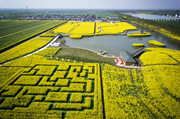Environmentalism cleans Zhangjiagang's streets
Updated: 2013-01-16
|
|||||||||
A FOREIGN guest in Jiangsu Province pulled a cigarette from his pack. As he moved it toward his mouth he noticed the motions and murmurs of those around him.
In confusion he tried to understand what they were saying. Finally he got the message, there is no smoking allowed on the pedestrian walkways in the city of Zhangjiagang, a city in Jiangsu Province.
Anyone caught spitting, littering or smoking in the street will be given street cleaning duty, and later will wear a yellow vest, patrolling the street for other violators. Like of game of tag, your duty is done when you nab the next offender.
What many places consider minor infractions are taken more seriously in Zhangjiagang.
"In our village we will fine anyone whose toilet is found to have even one fly, or whose tea cup has a tiny incrustation or who plays cards or mah-jong," said Lu Zhengyin. "In each case, the fine totals 1,000 yuan ($120)."
Lu is the deputy Party secretary of Changjiang Village as well as deputy general manager of the village's enterprise group.
"In April, a truck sprayed some paint on the express way. We followed the trail and found the polluter, a truck from a whitewash workshop. We ordered the driver to clean the street and then shut down the workshop," said Hu Jinpeng, mayor of the city.
Thanks to such strict measures, the city is unusually clean and tidy. All the streets and buildings seem to be brand new. Walls are clean of posters and the ground is clear of litter.
With a careful eye, however, visitors can spot enterprises that have been shut down.
"In the last three years, we have closed 29 enterprises for pollution and asked another 61 to make improvements within a given time limit," said the city's Mayor Hu Jinpeng.
A local chemical plant spent 45 million yuan ($5.4 million) to transfer its operation outside the city limits and to install new waste treatment facilities.
"The ultimate goal of developing the economy is to serve the people. Economic growth at the price of the environment is meaningless," said Qin Zhenhua, Zhangjiagang's Party secretary.
According to Qin, the polluting enterprises should be shut down even if they are manufacturing gold.
"On the issue of the environment, no compromise should be made. To protect the environment is to enhance productivity. It is also a precondition for economic development," said Qin.
In Zhangjiagang, any investors that want to launch projects must first obtain permission from the city's environment department. Those that produce pollution must have treatment facilities.
"Our model is Singapore," said Qin Zhenhua.
This ambition for overall social economic development has enhanced Qin's environmental sense. According to Qin, any social development will not be complete without relevant environmental protection measures.
With this ambitious aim in mind, Qin has been enhancing the city's environmental protection efforts on all fronts.
"My department has been entrusted with the right to veto projects approved by other government departments and shut down polluters," said Ji Junming, the city's environmental protection chief.
In May, his bureau ordered 21 enterprises to close or to have their production suspended or limited.
"In the past our slogan was: develop the economy and protect the environment; now our slogan is protect the environment and develop the economy," said Ji.
Their efforts seem to have paid off.
The city has 1,466 overseas-funded enterprises, with $3.6 billion of contracted investment.
During the first half of this year, its foreign trade value equalled the total of last year; and in the first five months, the foreign investment used in the city totalled $194 million.
In 1991 the GNP of the city was 3.2 billion yuan ($385 million) but in 1994 it jumped to 15.3 billion yuan ($1.84 billion), recording an annual growth of 68.4 per cent. Between 1992 and 1994, however, sulfur dioxide in its atmosphere decreased from 0.028 mg per cubic metre to the 0.022 mg per cubic metre. TSP (trisodium phosphate) in the atmosphere was reduced by 40 per cent and noise fell from 58.2 decibels to 54.1 decibels.
While in many other regions of the country, economic development and environmental protection are at odds, in Zhangjiagang they are in harmony.
"Here in Zhangjiagang environmental protection is treated as a truly basic State policy," said Xie Zhenhua, Director of the National Environmental Protection Agency on an investigation tour in the city earlier this month.
Xie said that economic development should never be achieved at the price of the environment.
"It seems that people in Zhangjiagang are taking this to their heart and have embarked upon the road of sustainable development," commented Xie.
Xie said that Zhangjiagang should be commended for shifting from the traditional development model characterized by high consumption of natural resources, serious pollution and low efficiency.







